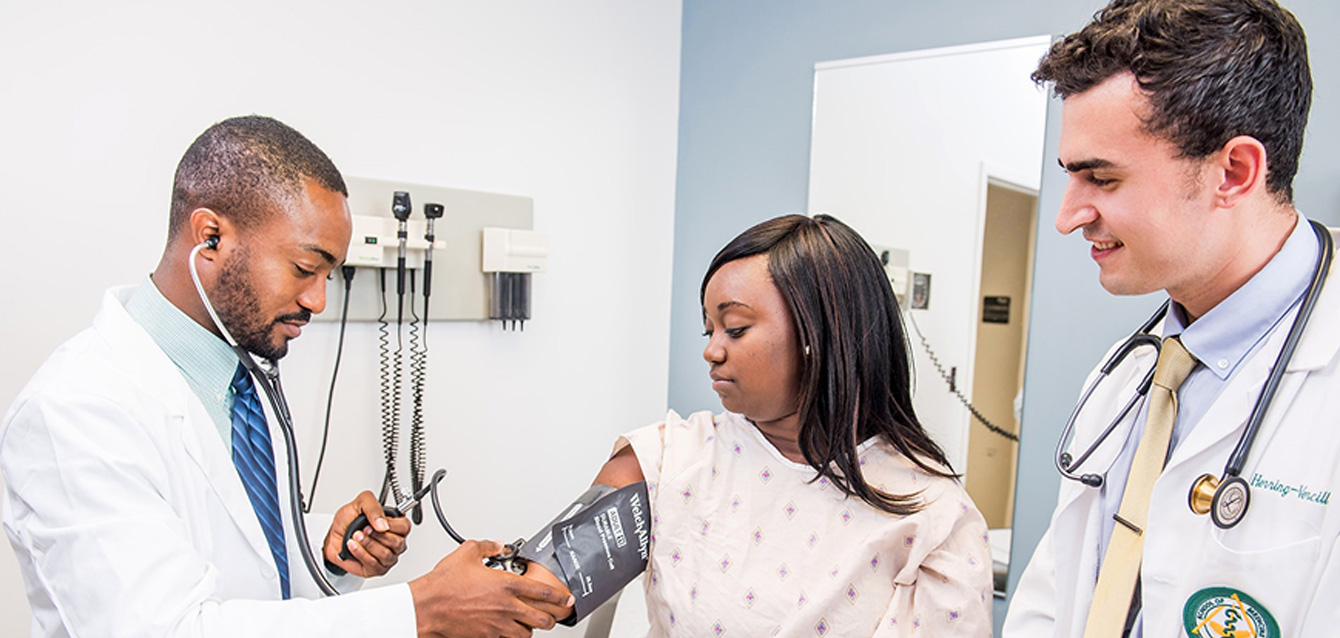Master of Science in Multidisciplinary Biomedical Science

Overview
If you're interested in careers in the medical field (e.g., medical, dental, PA, pharmacy school), research science, scientific policy, science communication, science education, biomedical sales, and more, the Master of Science in Multidisciplinary Biomedical Science (MBS) might be for you. This program is intended for domestic and international students that have some undergraduate STEM field training and wish to increase their knowledge of biomedical sciences.
Apply Now Opens an external link.
Curriculum and Concentrations
We offer an exciting, innovative curriculum. A wide range of elective classes are offered through several STEM-themed disciplines that cater to a wide array of career trajectories. Concentrations are available in many scientific disciplines unique to Masters programs in Alabama including: Cancer Biology, Genetics and Genomic Sciences; Neuroscience; Pharmacology; Bioinformatics; and Immunology. Courses are also available through UAB Graduate School’s Office of Interdisciplinary Graduate & Professional Studies (IGPS).
Request More Information
MBS Accelerated Bachelor’s/Master’s (ABM) Program
Through the Accelerated Bachelor’s/Master’s (ABM) Program in Multidisciplinary Biomedical Science (MBS), high-achieving undergraduate students may earn up to 12 credit hours of approved 500/600 level graduate courses that count simultaneously toward both their bachelor’s and master’s degrees, all at the undergraduate tuition rate. Upon successful completion, students graduate with both BS and MS degrees in approximately four years, positioning themselves in the job market with enhanced earning potential and a demonstrated ability in advanced critical thinking and problem-solving.
Virtual Recruitment Event
Interested in learning more about the Multidisciplinary Biomedical Science (MBS) program? Join Dr. John Shacka for a virtual recruitment session on Tuesday, October 21, 2025, from 11:00 a.m. to 12:00 p.m.
Research Opportunities
Hands-on, cutting-edge research opportunities. UAB is Alabama’s premier institution for biomedical research. UAB ranks in the top 20 nationally for research funding among public universities.
Flexible Start and Study Options
You can start the MBS program in fall or spring semesters, which provides students with important flexibility for beginning their graduate studies. Additionally, our program offers full-time or part-time options for students.
Individualized Mentoring and IDPs
Individualized mentoring. Students are encouraged to develop individualized mentoring plans (IDPs) with the MBS Program Director. IDPs focus the student for academic success while in the MBS program and they provide an important framework for students’ short-term and long-term career success.
Careers
The MS in Multidisciplinary Biomedical Science is intended as a terminal degree for students desiring many different career paths, including but not limited to: research (laboratory jobs in academia or industry), further graduate study (e.g. PhD), professional school (e.g. medical or dental), science education, scientific policy, science communication, or biomedical sales.
MBS Scholarships
The MBS program offers a select number of competitive, partial academic scholarships for newly admitted domestic or international MBS students who demonstrate academic excellence prior to joining our program, and who maintain academic excellence as a student in our program. Total amounts are up to $2500 for Plan II non-thesis students, and up to $5000 for Plan I thesis students. To be eligible for consideration, students must have a minimum 3.5 overall GPA in prior coursework before joining the MBS program. No application is required; selected recipients will be notified directly by Dr. Shacka. Below are details specific for Plan I vs. Plan II students:
-
Plan I (domestic or international)
- Up to $5000 total
- $2500 will be added to student accounts at the start of first and fourth terms
- Maintain minimum 3.5 Graduate GPA at the end of the third term to receive second disbursement
-
Plan II (domestic or international)
- Up to $2,500 total
- $1250 will be added to student accounts at the start of first and third terms
- Maintain minimum 3.5 Graduate GPA at the end of the second term to receive second disbursement
Admissions
Review of applications to the MBS program is a holistic approach that considers undergraduate GPA, personal statement, and letters of recommendation.
To be considered for direct-admittance to MBS, a minimum 3.0 GPA is required in any or all of the following categories of calculation:
- pre-requisite courses (Introductory Biology and labs; Organic Chemistry and labs)
- all "BCPM" (biology, chemistry, physics, math) courses
- overall (all courses)
In addition to Introductory Biology and Organic Chemistry, a background in the following courses is helpful for success in our program but is not required for admission: Genetics, Molecular Biology, Cell Biology, Biochemistry, Physiology.
GRE is not required. The minimum TOEFL score is 80. The minimum IELTS score is 6.5.
Once these materials are received and the application fee is processed, applications will be reviewed.
Application Deadline
| Fall | Spring |
|---|---|
| August 1, 2026 | December 1, 2026 |
Classes Begin
| Fall | Spring |
|---|---|
| August 24, 2026 | January 11, 2027 |
Curriculum
| Thesis (Plan I) | Non-Thesis (Plan II) | |
|---|---|---|
| Thesis committee | Yes | No |
| Credit Hours | 45 | 30 |
| Semesters | 6 | 3 |
Thesis (Plan I)
The Plan I MS in MBS thesis degree at UAB can be completed over the course of six semesters if full-time, including at least one summer semester. Plan I students will complete a rigorous mentored research project in addition to a curriculum of required core and elective classes related to the biomedical sciences.
Successful completion of the Plan I MS in MBS degree requires passing 45 credit hours (30 hours = coursework; 15 hours = supervised research) and maintaining a minimum 3.0 GPA.
-
Program Requirements
Successful completion of the Plan I MBS degree requires passing 45 credit hours and maintaining a minimum 3.0 GPA. These credit hours are composed of 30 hours of coursework and 15 hours of supervised thesis research (MBS 698 & 699).
Coursework
Plan I students must complete the following required classes:
- Core science (MBS 601 (4 hours), 602 (4 hours), 603 (4 hours), 12 hours total);
- Biostatistics (BST 603, 3 hours) or equivalent with permission;
- One semester of introduction to research (MBS 697, 2 hours)
- Four semesters of colloquium (MBS 697 (1 hour), 4 hours total);
- Three-four semesters of non-thesis research (MBS 698 (3 hours), 9-12 hours total);
- One-two semesters of thesis research (MBS 699, 6 hours total); and
- Electives (9 hours total).
Students have the option of earning a concentration by completing their elective credit hours in a single subject area.
Research
Plan I students must complete five separate semesters of research, including three-four semesters of MBS 698 (non-thesis research) and one-two semesters of MBS 699 (thesis research, at least one semester is required). When registered for MBS 698 or MBS 699, students are expected to work on average a minimum of 12-15 hours/week on their research projects. Students are expected to have chosen a faculty thesis adviser early in the first semester they are registered for MBS 698. Plan I students will form a committee of three faculty that is chaired by their thesis adviser and are required to hold a minimum of three committee meetings (1: introductory; 2: qualifying exam; 3: thesis defense; additional meetings may be needed depending on student progress). The thesis project must be approved by the student’s committee.
For the qualifying exam, Plan I students are expected to prepare a 4-6 page “NIH-style” grant proposal of their research project and present this to their committee. Plan I students are also required to subsequently complete a thesis document of their research findings and defend this to their committee. Research projects performed by Plan I students should be able to be completed within 5 semesters. Before students can perform research they must complete all lab-specific safety training. Students must also complete Responsible Conduct of Research (RCR) training for MS students before the end of their first semester registered for MBS 698.
Non-Thesis (Plan II)
The Plan II MBS non-thesis degree at UAB can be completed over the course of three semesters if full-time, including one summer semester. Plan II students will complete a rigorous curriculum of required core and elective classes related to the biomedical sciences.
Successful completion of the Plan II MBS degree requires passing 30 credit hours of coursework and maintaining a minimum 3.0 GPA.
-
Program Requirements
Plan II students must complete the following required classes:
- Core science (MBS 601 (4 hours), 602 (4 hours), 603 (4 hours), 12 hours total);
- Biostatistics (BST 603, 3 hours) or equivalent with permission;
- Colloquium (MBS 695, 1 hour)
- Skills lab (BT 650, 1 hour or BT 651, 1 hour), and
- Electives (12 hours total).
Students have the option of earning a concentration by completing their elective credit hours in a single subject area.
Concentrations
There are six concentration options within the MBS program:
- Bioinformatics
- Cancer Biology
- Genetics & Genomics Sciences
- Immunology
- Neuroscience
- Pharmacology & Toxicology
Course Descriptions
-
-
MBS 601: Molecular and Cell Biology
4 Credit Hours
This course will provide a broad but rigorous overview of molecular biology. Cell Structure and between prokaryotes and eukaryotes will be compared and contrasted. DNA structure/organization will be discussed with respect to replication and repair mechanisms. Mendelian, non-Mendelian and chromosonal bases of genetics will also be discussed. Transcription and translation will be discussed in detail, along with their respective regulatory mechanisms. Throughout this course there will be a focus on intracellular organelles that contribute to the generation and regulation of DNA, RNA and protein.
-
MBS 602: Biochemistry and Cell Biology
4 Credit Hours
This course will cover the structure, function and metabolism of biological macromolecules including proteins, carbohydrates, lipids and nucleotides. A rigorous overview of pathways will be discussed that are important for the effective metabolism of macromolecules (e.g. glycolysis, citric acid cycle) and generation of energy for cells. The last part of this course will discuss membrane structure and function, and will provide an overview of eukaryotic cell signaling./p>
-
MBS 603: General Human Physiology
4 Credit Hours
This course begins with the study of basic cell function, then proceeds to a rigorous overview of specific human organ systems.
-
BST 603: Introductory Biostatistics for Graduate Biomedical Sciences
3 Credit Hours
This course will provide non-biostatistics students seeking a Graduate Biomedical Sciences (GBS) degree with the ability to understand introductory biostatistics concepts.
The following alternatives may be substituted for BST 603 with permission of the MSMBS program director:
- BST 611
-
BT 650: Applications in Biotechnology I or BT 651: Applications in Biotechnology II (Plan II Program)
2 Credit Hours
BT 650: Lab provides the opportunity to set-up, perform, and interpret the results of various molecular assays. These include, but are not limited to, the following: nucleic acid isolation, enzymatic manipulation of nucleic acids, gel electrophoresis, amplifications reactions and hybridization reactions. Most of the laboratory work will involve a eukaryotic system.
BT 651: A laboratory that prepares students for the biotechnology industry by teaching how recombinant DNA can be used to generate specific proteins in any protein expression system. -
MBS 695: Non-Thesis Colloquium (Plan II Program)
1 Credit Hours
This course will provide a rigorous overview of scientific reading, writing, and presenting skills, with a focus on career development. Students will work in teams to read, present and critique journal club articles; prepare and review resumes, individualized development plans (IDPs) and personal statements, followed by submission of re-writes; and learn effective interview skills via mock interview format.
-
MBS 697: Colloquium for MBS Plan I Thesis Students (Plan I Program)
MBS 697: Intro to Research” section (2h)
This class will introduce students to research opportunities as a Plan I student in the MS Program in Multidisciplinary Biomedical Science (MBS) program. Students will focus on improving scientific communication skills and scientific writing skills during their process of matching with research mentors.
MBS 697: “Journal Club” section (1h)
This required colloquium course will be taught using a journal club format. Students will be taught to critically review scientific literature, while gaining effective written and oral scientific communication skills. Students working in small groups will be responsible for choosing a current biomedical research article and sharing their review of this article in a Power Point (PPT) presentation. Student audience members will be responsible for asking questions during the presentation and for submitting a review of each article in abstract form. The Course Director will provide initial instruction in the critical review, presentation and written summary of scientific literature. Topics to be covered include: critical review (background and rationale for study; identification of hypothesis; description of methods used; presentation of results and their interpretation; indicate significance of study and describe next step experiments), effective communication of research articles via Power Point presentations; and writing assignments based on articles discussed in class. When possible, scientific integrity in research will be a focus of in-class discussions.
MBS 697: “Qualifying Exam Proposal” section (2h)
This course section will focus on practicing scientific presentation and writing skills, as students prepare for their qualifying exams. Students will give short and long presentations of their original research in class, followed by a Q&A session, in a format similar to the QE. In addition, students will complete a writing assignment in the style of R21 grant application, discuss their ideas in class through presentation, and perform peer review editing of each other’s written work. Finally, at the end of the course, you will do a mock interview in preparation for application to PhD programs.
MBS 697: “Thesis Defense” section (1h)
This course will provide a space for students to practice their thesis defense and receive constructive feedback; to draft the introduction to their written thesis and receive peer review feedback. Finally, at the end of the course, you will do a mock interview in preparation for application to PhD programs.
-
MBS 698: Non-Thesis Research (Plan I Program)
0 – 6 credit hours
Students may perform independent study in a research laboratory setting. This work may contribute toward concentration credits subject to Program Director approval.
-
MBS 699: Thesis Research (Plan I Program)
1-6 credit hours
Supervised independent research.
-
MBS 601: Molecular and Cell Biology
-
Plan I students must complete 9 credit hours and Plan II students must complete 12 credit hours of elective courses. Completion of 9 credit hours from a single theme is required to earn one of the MSMBS program concentrations. These are currently:
- Bioinformatics
- Cancer Biology
- Genetics & Genomics Science
- Immunology
- Neuroscience
- Pharmacology & Toxicology
The courses that are pre-approved to satisfy the elective requirements for each theme are listed below:
-
Bioinformatics
• INFO 601: Introduction to Bioinformatics
• INFO 602: Bioinformatics II-Algorithms
• INFO 603: Biological Data Management
• INFO 604: Next-gen Sequ Data Analysis
• INFO 610: Programming with Biological Data
• INFO 625: Data Visualization for Bioinformatics
• INFO 662: Biomed Appl Nat Lang Processing
• INFO 691: Bioinformatics Seminar I -
Cancer Biology
• CNBY 600: Introduction to Cancer Biology
• CNBY 610: Cancer Cell Growth
• CNBY 620: The Cancer Genome
• CNBY 630: The Tumor Terrain
• CNBY 640: Tumor Signaling Pathways
• CNBY 660: Cancer Immuno-histopath
• CNBY 670: Oncology Therapy -
Genetics & Genomics Sciences
• GGSC 610: Genetic Basis of Human Disease
• GGSC 615: Aquatic Animal Models of Human Disease
• GGSC 620: Applications of Bioinformatics
• GGSC 621: Immunogentics
• GGSC 635: Zebrafish Models
• GGSC 650: SpTp: Genetics/Genomic Science
• GGSC 651: Genetics Science & Tech
• GGSC 665: Research Techniques for Aquatic Animals of Human Disease
• GGSC 670: Principles of Pharmacogenetics
• GGSC 690: Model Systems for Genetic Disorders
• GGSC 691: Personalized Genomic Medicine -
Immunology
• MIC 660: Introduction to the Immune System
• MIC 661: Immune-mediated Diseases
• MIC 665: Current Topics in Immunology -
Neuroscience
• NBL 600: Special Topics: Neurogenetics
• NBL 620: No Self Control
• NBL 625: Methods in Human Neuroimaging
• NBL 632: Basic Science of Nervous System
• NBL 633: Diseases of the Nervous System
• NBL 634: Mechanisms of Memory
• NBL 644: Memento Mori-Neurodegeneration
• NBL 655: Synapses, Neurons and Brains
• NBL 656: From Systems to Cognitive Neuroscience
• NBL 684: Biological Rhythms and Sleep
• PY 520: Sensation and Perception
• PY 520: Special Topic: Human Psychophysiology
• PY 520: Special Topic: Psychology of Learning
• PY 635: Motivation and Emotion
• PY 620: ST: Cognitive Neuroimaging
• PY 653: Foundations of Behavioral Neuroscience
• PY 683: Developmental Disabilities
• PY 687: The Dynamics of Pain
• PY 693: Cognitive Neuroscience -
Pharmacology & Toxicology
• PHR 611: Physiological Principles of Pharmacology & Toxicology
• PHR 612: Organ Systems Physiology & Pharmacology I
• PHR 613: Organ Systems Physiology & Pharmacology II
• PHR 614: Drug Development
• PHR 615: Pharmacokinetics
• PHR 616: Cancer Physiology & Pharm
• PHR 696: Special Topics: Neuropharmacol
-
All courses listed under this section in addition to the concentration courses, can be used to meet the program requirements for electives.
-
Anthropology
- ANTH 645: Medical Anthropology & Health Disparities
-
Biology
- BY 511: Molecular Genetics
- BY 512: 21st Century Gene Editing
- BY 527: Histology & Lab
- BY 530: Graduate Cell Biology
- BY 535: Natural History of Vertebrates
- BY 555: Biol Data Interpret & Analysis
- BY 570: Ecology
- BY 595: Special Topics: Adv Genetics
- BY 607: Microbial Ecology
- BY 614: Advanced Cell Biology
- BY 616: Cellular Physiology
- BY 617: Science Policy
- BY 618: Colloquium in Biology of Aging
- BY 626: Evolutionary Medicine
- BY 629: Evolutionary Biology
- BY 633: Advanced Molecular Genetics
- BY 636: Biological Processes in Aging
- BY 637: Epigenetics
- BY 640: Immunology
- BY 642: Experimental Phycology & Lab
- BY 644: Biological Experimental Design & Methods
- BY 647: Contemporary Political Issues in Science
- BY 651: Advanced Plant Biology
- BY 655: Biometry
- BY 662: Introductory Neurobiology
- BY 674: Chemical Ecology
- BY 675: Comp Developmental Biology
- BY 677: Design Thinking to Solve Problems through Science Policy
- BY 680: Epigenetics Discussion
- BY 688: Colloquium in Algal Ecophysiol
- BY 689: Colloquium in Genetics
- BY 692: Colloquium in Ecology
-
Graduate School Professional Development
• GRD 617: Critical Thinking and Scientific Integrity
• GRD 701: Presentation & Discussion skills
• GRD 703: Special Topics vary but may be appropriate
• GRD 705: Teaching at the College Level
• GRD 706: Grants and Fellowships 101
• GRD 708: Writing Effectively
• GRD 709: Writing Fellowships
• GRD 713: Mentoring 101
• GRD 716: Dev. A Teaching Portfolio
• GRD 719: Intro Mentoring & Leadership
• GRD 722: Writing Research Broad Audience
• GRD 730: Develop & Manag Prof Image
• GRD 735: Leadership 101
• GRD 751: CIRTL Teaching Methods
• GRD 759: CIRTL TAR In STEM Courses
• GRD 760: CIRTL TAR Project
• GRD 761: CIRTL SpTp: Assessing Learning
• GRD 774: Intro to Regulatory Compliance -
Health Professions
- HRP 526: Preparation for Professional School and Exam Preparation in Health Professions
-
Leadership
• LEAD 500: Intro to Leadership Behavior & Theories
• LEAD 501: Professional Writing
• LEAD 502: Professional Presentations
• LEAD 503: Interview and Interviewing
• LEAD 505: Prioritization and Decision Making
• LEAD 506: Emotional Intelligence
• LEAD 520: Ethnics in the Workplace
• LEAD 521: Servant Leadership
• LEAD 522: Followership
• LEAD 523: Gender Dynamics in Leadership
• LEAD 524: Intergenerational Leadership
• LEAD 525: Resilient Leadership
• LEAD 540: Team Development and Dynamics
• LEAD 542: Managing and Leading Teams
• LEAD 543: Leading and Planning Meetings
• LEAD 544: Conflict Negotiation
• LEAD 560: ST: Leadership Development Workshop
• LEAD 570: ST: Leadership Development Seminar
• LEAD 580: Lead Transformational Change
• LEAD 590: Leadership by Design -
Physician Scientist Development Office
- PSDO 630: Physician Experience
-
RECM Research Communications
- RECM 707: Presenting Effectively (FA, 1 credit)
- RECM 727: Writing & Reviewing Research (FA, 3 credits)
- RECM 739: Research Comm Portfolio (3 credits)
- RECM 745: Research Comm & Div Aud (FA, 3 credits)
-
Research Lab Management
- RLM 773: Research Lab Management (FA, 3 credits)
-
Anthropology
Testimonials
-

“As a student who wants to be competitive in the medical field, the MBS program at UAB was something I urgently needed. This program has been nothing short of a miracle, thoroughly enhancing my networking abilities, deeply refining & calling on my knowledge in sciences, and forcibly improving my time management & study skills. This program has enormously contributed to my growth as a student & scholar.”
Cam Washington MSMBS current student
-

“I've developed advanced research skills, teamwork abilities, passion for innovation, and a network of inspiring peers and mentors. My time in this program has been enriched, with opportunities to work on cutting-edge research projects and collaborate with talented peers and faculty.”
Aditi Ranga Shanbhag MSMBS current student
-

“I’ve gained an incredible foundation in biomedical science. The core courses are application-based and taught through group learning, study sessions, and discussions, making it easier to understand complex medical and dental concepts.”
Shreya Hiwalkar MSMBS current student